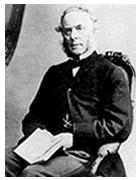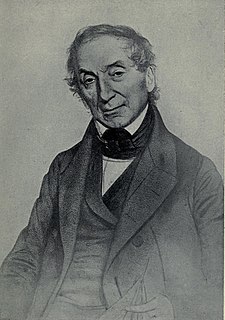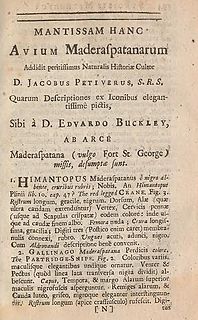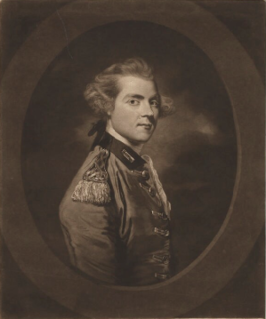Related Research Articles

The East India Company College, or East India College, was an educational establishment situated at Hailey, Hertfordshire, nineteen miles north of London, founded in 1806 to train "writers" (administrators) for the Honourable East India Company (HEIC). It provided general and vocational education for young gentlemen of sixteen to eighteen years old, who were nominated by the Company's directors to writerships in its overseas civil service. The college's counterpart for the training of officers for the company's Presidency armies was Addiscombe Military Seminary, Surrey.

Robert Fortune was a Scottish botanist, plant hunter and traveller, best known for introducing around 250 new ornamental plants, mainly from China, but also Japan, into the gardens of Britain, Australia, and the USA. He also played a role in the development of the tea industry in India in the 19th century.

Nathaniel Wolff Wallich FRS FRSE was a surgeon and botanist of Danish origin who worked in India, initially in the Danish settlement near Calcutta and later for the Danish East India Company and the British East India Company. He was involved in the early development of the Calcutta Botanical Garden, describing many new plant species and developing a large herbarium collection which was distributed to collections in Europe. Several of the plants that he collected were named after him.

John Lindley FRS was an English botanist, gardener and orchidologist.

William John Burchell was an English explorer, naturalist, traveller, artist, and author. His thousands of plant specimens, as well as field journals from his South African expedition, are held by Kew Gardens, and his insect collection by the Oxford University Museum.

The University of Oxford Botanic Garden is the oldest botanic garden in Great Britain and one of the oldest scientific gardens in the world. The garden was founded in 1621 as a physic garden growing plants for medicinal research. Today it contains over 5,000 different plant species on 1.8 ha. It is one of the most diverse yet compact collections of plants in the world and includes representatives from over 90% of the higher plant families.

John Forbes Royle, British botanist and teacher of materia medica, was born in Kanpur in 1798. He was in charge of the botanical garden at Saharanpur and played a role in the development of economic botany in India.
Abbé J. A. Dubois or Jean-Antoine Dubois was a French Catholic missionary in India, and member of the Missions Etrangères de Paris; he was called Dodda Swami by the local people. In his work on Hindu manners, customs and traditions he presented Indian cultures, traditions, thoughts and the varnasrama system. He returned to France, and authored a book of Indology, Hindu Manners, Customs and Ceremonies.
Toussaint Dubois was a Montreal born Frenchman and American soldier who joined with Lafayette to fight for American independence in the American Revolutionary War.

John Dubois, served as the third bishop of the Roman Catholic Diocese of New York. He was the first Bishop of New York who wasn't Irish-born and, as of 2021, he remains the only Bishop, or Archbishop, of New York who was not either of Irish-birth or of Irish ancestry.

Charles Francis Massy Swynnerton CMG was an English naturalist noted for his contributions to tsetse fly research.
George Berkeley, 1st Earl of Berkeley PC FRS was an English merchant and politician who sat in the House of Commons from 1654 until 1658 when he succeeded to the peerage.

James Timothy DuBois (born May 4, 1948 is a Certified Public Accountant and a Nashville-based songwriter and recording industry executive who has headed both Arista Records and Universal South Records. As a songwriter he wrote five No. 1 country hits. His most successful song was the world-wide hit "Love in the First Degree" recorded by the group Alabama.
Simon Du Bois or Dubois ), was a portrait painter, of Flemish or Dutch origin, active in England from 1685 until his death.
Charles Dubois is the name of:
Dr Robert Uvedale (1642–1722) was an English cleric teacher and horticulturist. He ran a grammar and boarding school north of London, took part in botanical exchanges, and published as a classical scholar.
Sir Francis Child the younger, of the Marygold, by Temple Bar, and Osterley Park, Middlesex, was a British banker and politician who sat in the House of Commons from 1722 to 1740. He was Lord Mayor of London in 1731.
John Rudge, of Mark Lane, London and Evesham Abbey, Worcestershire, was a London merchant and financier, and Whig politician who sat in the House of Commons almost continuously between 1698 and 1734. He was a Governor of the Bank of England from 1713 to 1715.

Edward Bulkley was an East India Company surgeon (1602-1709) posted in Madras and a pioneer naturalist. He corresponded with James Petiver and was the first to document the bird species of which a list of birds was published by John Ray. Ray incorrectly notes him as "Buckley". Bulkley also studied the local plants and corresponded with the Jesuit botanist Georg Joseph Kamel and acted as an intermediary between Kamel and Petiver. Bulkley corresponded with Charles du Bois on plants and collected Tamil and Telugu names for many medicinal and economically useful plants.

Sir Robert Fletcher was an officer of the East India Company and a member of parliament for Cricklade. Fletcher joined the East India Company as a junior clerk in 1757 but soon transferred to its army. As a lieutenant he was cashiered (dismissed) for insolence but was later restored. Fletcher was awarded a knighthood for gallantry in battle and rose in rank to lieutenant-colonel in command of a brigade. He was court-martialled and cashiered for the second time by Robert Clive for involvement in the 1766 Monghyr Mutiny.
References
- 1 2 3 Jackson, B. D. (rev. P.E.Kell) (2008). "Dubois, Charles (bap. 1658, d. 1740)". Oxford Dictionary of National Biography. Oxford University Press. doi:10.1093/ref:odnb/8113.
- 1 2 Jessop, J. (1989). "Notes on Insects, 1692 & 1695 by Charles duBois". British Museum (natural history). Historical Series. 17 (1): 1–165.
- ↑ Don, George (1838). A general history of the dichlamydeous plants, comprising complete descriptions of the different orders. Volume IV. Corolliflorae. London. p. 479.
![]() This article incorporates text from a publication now in the public domain : "Dubois, Charles". Dictionary of National Biography . London: Smith, Elder & Co. 1885–1900.
This article incorporates text from a publication now in the public domain : "Dubois, Charles". Dictionary of National Biography . London: Smith, Elder & Co. 1885–1900.